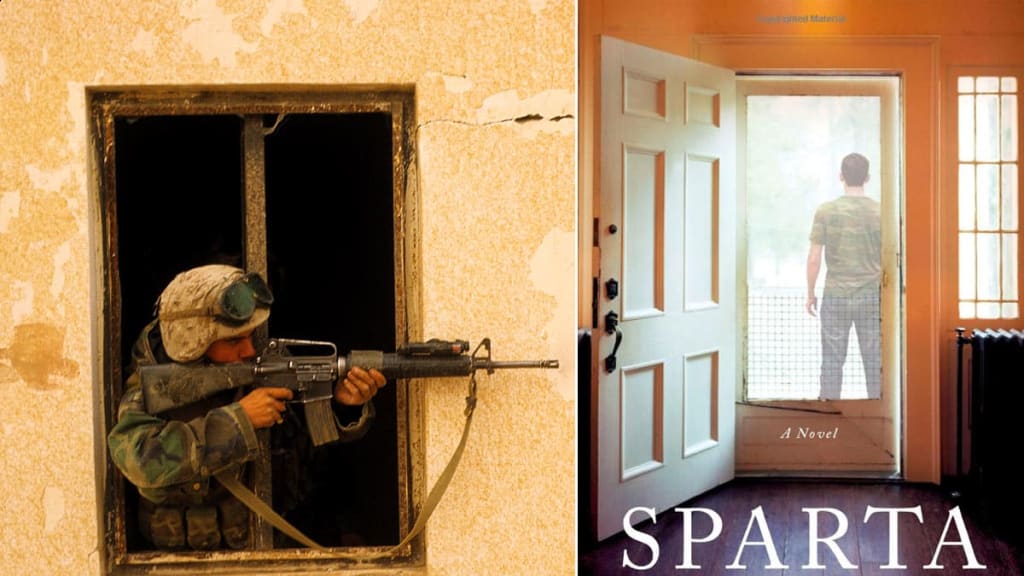
In this paper I will discuss my reflections about countertransference regarding the novel, Sparta by Roxana Robinson. Conrad experiences with post-traumatic stress disorder symptoms and severe anxiety reminded me of friends and family members that have served in the military. A few people that I know have expressed to me their thoughts and feelings of being torn between civilian life and the life of a soldier. I have seen their pain. And to read about another person’s experiences, reminded me of those long nights of comforting my friends and family members. I have seen people that I care about try to hide or deny what they are experiencing, and eventually, they explode and have come close to hurting someone that they love. Reading Conrad’s story took me back to those moments in my life. This book helped me to gain a better understanding of my experiences with second hand trauma and my view of the military world.
Sparta, was at times, was tough to read. Not because of being written poorly, but rather because it was written very well. The way Robinson reveals the details of an Iraq war veteran and the trials he faces upon his return is very comparable to how it is for most soldiers who return home after war. Robinson was on point in her graphic description of a soldier and his struggle with PTSD. It is a novel that offers insight into the world of a soldier and the opinions of his family. I shared this read with my military friends and family and when they validated much of Conrad's perspective and journey, it opened a door to self-awareness and forced me to process my own thoughts, feelings, views, and knowledge of military life.
I, personally, have never served in the military. My grandfather was Navy, my mother was Army, and my uncle is still an active service member. My mother and grandfather never share stories of military life. I think the closest that my mother came to telling stories was when she shared photos of Germany and the fact I was born on base. Now my uncle on the other hand, he will never tell war stories. He is not even allowed to say who, what, when, where, or why. He just tells us that he will send word that he is alright, and we accept that. And my first husband served as a Green Beret for 8 years. And then my current husband was in the Army. That being said, for the most part, I do not think I had a “normal” military upbringing.
But what is “normal”? After reading Sparta, I wonder just that. As I read the book, I would reflect on my own experiences and share my thoughts with my military friends. To say the least, I think I have taken more from this book that I thought I would. A few things stick out to me. Like in chapter 18 when Conrad realizes he missed his brother and sister growing up. He noticed that his sister’s toenails were blue, and she made a joke about drugs, when he inquired as to her trying drugs, that is the moment it hit him (Robinson, 2014, p. 245). What runs through my mind is my uncle. He missed all my younger years. He is still missing the majority of his children’s lives. Reading this makes me wonder, how much does my uncle hurt? How does he set aside his emotions and function? Then I begin to question how my cousins and my aunt cope and manage their emotions. What guilt or loss to they feel? In the book, Conrad and his sister discuss how they are “both different now. It’s kind of weird, trying to get to know you own brother again.” Conrad questions if she feels like she doesn’t know him, in that instance my heart drops. I never once questioned who my uncle was. I just knew he was my hero and everyone else’s hero as well. Then I think about my cousins, do they know their dad? Does my uncle ever question this? This may be odd, but this part of the book stood out the most to me. It may seem small or insignificant, but for me it was huge, and it hits to the foundation of everything. If you are a soldier and your family doesn’t know who you are, then who is your support system? And without a support system, how can you get the help needed after experiencing the things soldiers do?
Another part of Sparta that spoke to me was when Conrad and Claire had the discussion or argument over who she had relations with while he was deployed. That moment when she said, “You can’t just arrive home and move back in. My life is different. Things aren’t the way they used to be.” (Robinson, 2014, p. 149). For me, this struck a nerve just a bit. In the moment, I realized that I do have a bias. My bias is against non-military members. I was upset with Claire. In my mind she was wrong for saying that. The way I was raised was basically not to ask and don’t expect a story, but it was still understood that unconditional support was given. It was known to expect emotional issues, stress, mental issues, and so on but the point was to care for our soldier’s well-being at whatever cost. So, when Claire said those words, it struck a nerve. I thought she was not being supportive. It was almost like a betrayal. But after reflection and the completion of the book, I no longer feel that way. I can see how she would feel, after all, Conrad was her boyfriend, not a family member and the dynamics between them are unique. Overall, this gave me insight and awareness of my own feelings about military support and knowing that, will help me to be a better counselor.
Though there were many things within this book that I could speak on, I close with the part when Conrad deals with the VA. I know that doctors are busy. I know that the VA is busy. But I still believe in old fashion work ethics especially in the medical or mental health fields. Educate yourself on the client prior to meeting them! I completely understand Conrad’s irritation with Dr. Chandler. “Conrad. Why don’t you tell me about your record and your deployment?” (Robinson, 2014, p. 367). That just frustrates me to no end. The VA does not have a good reputation to begin with, the author just fuels that negative opinion that I already have. Overall, I do not feel that Conrad received the best of care that day. What made it worse was when the doctor interrupted Conrad sharing his experience just to answer the phone. NO! Not only is that poor bed-side manor, but it tells the client that as a health professional, you do not give two shits about the client. This is one opinion of health care providers (in and out of the VA) that will most likely never change, if you treat your clients the way Dr. Chandler treated Conrad, then you are in the wrong profession.
To address my countertransference, I would seek additional counsel from a superior or from my own therapist. Being aware of my thoughts, feelings and biases is just the first step in addressing my countertransference. The next step is to reflect on said awareness and seek guidance. But within session, I could utilize breathing techniques so to not distract from the client’s needs. And again, after session, I would seek guidance.
References
Robinson, R. (2014). Sparta. New York: Picador.
About the Creator
Rebecca K
As a lover of arts and the the truth I enjoy writing. It allows me to express myself while sharing life lessons, precious moments and even the unspeakable moments. I encourage feedback on my posts so feel free to speak your mind. Thank you






Comments
There are no comments for this story
Be the first to respond and start the conversation.